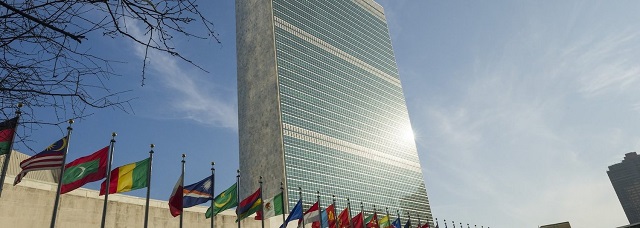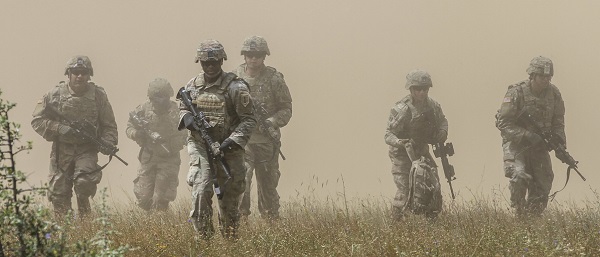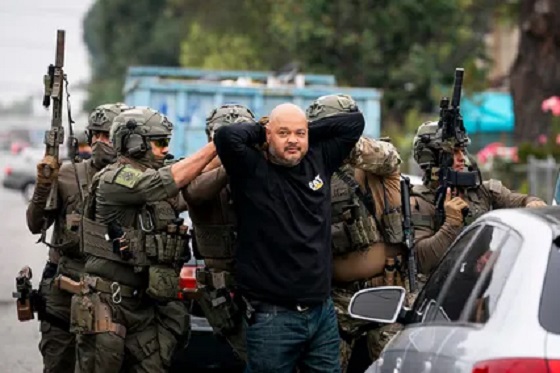International
Can We Finally Talk About United Nations Funding?


David Clinton 
Billions of dollars disappear into the black hole. Not much value comes out the other end
No area touched by government policy should be off-limits for open discussion. It’s our money, after all, and we have the right to wonder how it’s being spent. Nevertheless, there’s no shortage of topics that, well, aren’t appreciated in more polite company. Until quite recently, I somehow assumed that Canada’s commitments to the United Nations and its many humanitarian programs were among those restricted topics. I had my own deep reservations, but I generally kept my thoughts to myself.
Then the Free Press published a debate over US funding for the UN. I know that many subscribers of The Audit also read the Free Press, so this probably isn’t news to most of you. If questioning UN funding was ever off limits, it’s officially open season now.
The Audit is a reader-supported publication. To receive new posts and support my work, consider becoming a free or paid subscriber.
The only defense of the organization to emerge from the debate was that America’s spooks need the surveillance access made possible by the UN headquarter’s New York address, and the city needs the billions of dollars gained from hosting the big party. No one, in other words, could come up with a single friendly word of actual support.
For context, Canada doesn’t bill for parking spots around Turtle Bay in Manhattan. And our spies are not up to the task of bugging hospitality suites anywhere nearby.
How much money do Canadian taxpayers spend on the United Nations? According to data from Canada’s Open Government resource, UN-targeted grants cost us at least $3.7 billion between 2019 and 2022. That number could actually be a lot higher since it’s not always easy to identify spending items as specifically UN-related.
Of that $3.7 billion, more than $265 million went to administrative and headquarters operations. Those administrative grants included $209 million directed to the “United Nations Organization” and officially described as “Canada’s assessed contribution to the United Nations Regular Budget”. Membership dues, in other words.
So what do we get for those dues? Arguably, nothing at all. Because the actual work of the UN happens through their specific programs – which were covered by the other $3.5 billion we contributed.
Unfortunately, those contributions are often misspent. Take as an example the eight million or so dollars Canada sends each year to the United Nations Interim Force in Lebanon (UNIFIL). Since 1978, UNIFIL’s 10,000-strong contingent’s only job has been to:
“confirm Hezbollah demilitarization, support Lebanese army operations against insurgents and weapon smuggling, and confirm Israeli withdrawal from Lebanon, in order to ensure that the government of Lebanon would restore its effective authority in the area”.
It’s no secret how splendidly that worked out. Hezbollah cheerfully spent the best part of the past two decades building some of the most robust military infrastructure on earth. And all under the direct supervision of UNIFIL.
Then there’s the disturbing relationship between United Nations Relief and Works Agency for Palestine Refugees in the Near East (UNRWA) and both Hamas and Hezbollah. As I’ve already written, by their own admission, Global Affairs Canada completely missed (or chose to ignore) that one. UNRWA cost Canadians $55 million between 2019 and 2022.
It’s true that some UN peacekeeping missions from decades back saw success, like operations in Namibia, Mozambique, Sierra Leone, East Timor, and El Salvador. But the failures were, to say the least, noticeable. Those included Rwanda, Bosnia and Herzegovina, Somalia, Angola, Haiti, and Darfur. And all that’s besides the accusations of widespread, systemic sexual abuse committed by peacekeepers just about anywhere they go. The peacekeeping model’s value proposition is far from proven, but the financial costs are right out there in the open.
Besides their regular happens-to-the-best-of-us failures, the UN has carefully cultivated their own unique brand of corruption. In 2005, Paul Volcker’s Independent Inquiry Committee (IIC), for example, reported on widespread corruption and abuse associated with the UN’s Oil-for-Food program for Iraqi citizens.
The United Nations Educational, Scientific and Cultural Organization (UNESCO) has long been associated with corruption, cronyism, and a general lack of financial control. But to be fair, those claims are very much in line with accusations regularly leveled against the UN as a whole.
Most Canadians are agreeable to sharing their collective wealth and expertise with those around the world who are less fortunate. But we’d be far more effective at it by creating our own programs and bypassing the rotting corpse of the United Nations altogether. That is, after all, what Global Affairs Canada is supposed to be doing.
While I’ve still got your attention, there’s one other United Nations-y thing that I’d like to discuss. While researching this post, I accessed official data representing all UN Security Council and General Assembly resolutions since 2000. Fascinating stuff, I assure you. But it didn’t turn out the way I’d expected.
You see, for years I’ve been hearing about how UN resolutions are overwhelmingly focused on condemnations of Israel – to the point where Israel takes up the majority of the organization’s time.
In fact, there were far too many spurious and gratuitously hostile anti-Israel resolutions. And I defer to no one in my contempt for each one’s dishonesty and hypocrisy. But unless there’s something very wrong with the official UN data on resolutions, condemnations of Israel take up no more than a small minority of their time.
Specifically, of the 1,594 General Assembly resolutions from the past quarter century, just 60 or so targeted Israel. And the Security Council faced a total of 1,466 resolutions over that time, of which only somewhere in the neighborhood of 55 concerned everyone’s favorite colonial-settler, apartheid, space laser-firing, and weather-controlling oppressor.
The cesspool that is the modern UN is bad enough on its own merits. There’s no need to manufacture fake accusations.
Crime
Hero bystander disarms shooter in Australian terror attack

Insane footage shows a bystander attacking and disarming one of the terrorists, who appears to have been armed with a long rifle, during today’s shooting attack on an event celebrating Hanukkah at Bondi Beach in Sydney, Australia. pic.twitter.com/mJceco22bJ
— OSINTdefender (@sentdefender) December 14, 2025
The chaos that struck Australia on Sunday night produced one moment of astonishing courage: a Sydney shopkeeper, armed with nothing but instinct and grit, charged a gunman at Bondi Beach and wrestled the rifle out of his hands as terrified families ran for cover. Authorities say the act likely prevented even more deaths in what officials have already called an antisemitic terror attack that left 12 people dead and dozens wounded during a Hanukkah celebration along the water.
The hero has been identified as 43-year-old fruit shop owner Ahmed Al Ahmed, a father of two who happened to be nearby when gunfire erupted at the beachfront event “Hanukkah by the Sea,” which had drawn more than 200 people. Footage captured the moment he marched toward the shooter, grabbed hold of the rifle, and overpowered him in a brief, violent struggle. As the gunman hit the pavement, Al Ahmed momentarily pointed the weapon back at him but didn’t fire, instead placing it against a tree before another attacker opened up from a bridge above. He was hit in the hand and shoulder and is now recovering after emergency surgery.
A relative told Australia’s Channel Seven that Al Ahmed had never handled a gun in his life. “He’s a hero — he’s 100 percent a hero,” the family member said. New South Wales Premier Chris Minns echoed the praise, calling the scene “unbelievable,” adding, “A man walked up to someone who had just fired on the community and single-handedly disarmed him. Many people are alive tonight because of his bravery.”
Police say two shooters stepped out of a vehicle along Campbell Parade around 6:40 p.m. and began firing toward the beach. One gunman was killed, the other is in custody in critical condition. Detectives are also investigating whether a third attacker was involved, and bomb units swept the area after reports that an explosive device may have been planted beneath a pedestrian bridge. The toll is staggering: 12 dead, including one shooter, and at least 29 wounded — among them children and two police officers.
Prime Minister Anthony Albanese condemned what he called “a targeted attack on Jewish Australians on the first day of Hanukkah,” saying, “What should have been a night of joy and peace has been shattered by this horrifying evil attack.” Emergency crews flooded the beach as hundreds of panicked people sprinted away from the gunfire. Video shows one attacker firing down toward the sand from the bridge behind Bondi Park before being shot himself in a final standoff captured by drone footage. Both gunmen appeared to be carrying ammunition belts, with witnesses estimating up to 50 rounds were fired.
Australian police have cordoned off properties linked to the suspects and continue to canvass Bondi for additional threats. What remains clear is that Sunday’s attack was met with extraordinary acts of self-sacrifice, none more dramatic than a shopkeeper from Sutherland who walked into gunfire to stop further slaughter.
Crime
Terror in Australia: 12 killed after gunmen open fire on Hanukkah celebration

One of the suspected gunmen of the Bondi Beach massacre shooting in Australia has been identified as Naveed Akram
What was supposed to be a peaceful Sunday evening celebration of Hanukkah on one of the world’s most famous beaches instead descended into chaos and bloodshed, as two attackers opened fire on crowds gathered at Sydney’s Bondi Beach, killing 12 people — including one of the gunmen — and injuring at least 11 others.
The violence erupted shortly after 5 p.m. local time, just as more than a thousand people were gathering for “Hanukkah by the Sea,” an annual event held near a playground at the Bondi foreshore. According to Australian outlets, the shooting began as families were lighting candles and singing, sending parents scrambling to shield children and worshippers diving for cover along the promenade.
New South Wales Premier Chris Minns confirmed late Sunday that one attacker was killed at the scene and a second was arrested. He said the evidence already points unmistakably toward an anti-Jewish terror attack. “What should have been a night of peace and joy was shattered by a horrifying, evil attack,” Minns told reporters, noting investigators believe the plot was “designed to target Sydney’s Jewish community.”
NSW Police Commissioner Mal Lanyon said well over a thousand people were present when the shooting started, including two state police officers who were among those struck by gunfire, according to ABC News. Police also located what appeared to be an improvised explosive device in the vicinity shortly after the initial gunfire. Bomb technicians neutralized the device while officers locked down the area and urged residents to shelter in place.
Around 9 p.m., with ambulances and tactical units pouring in, authorities described the unfolding chaos as a “developing incident” and warned anyone nearby to stay indoors. Multiple victims were treated on the sand and the surrounding walkways before being rushed to hospitals across Sydney.
As investigators piece together the attackers’ movements and motive, officials say the toll could have been even worse given the size of the crowd and the presence of children throughout the event. What remains is a shaken city, a grieving Jewish community, and a country once again confronting the threat of political and religious extremism on its own soil.
-

 Crime20 hours ago
Crime20 hours agoTerror in Australia: 12 killed after gunmen open fire on Hanukkah celebration
-

 Crime20 hours ago
Crime20 hours agoHero bystander disarms shooter in Australian terror attack
-

 Business1 day ago
Business1 day agoInflation Reduction Act, Green New Deal Causing America’s Energy Crisis
-

 Business2 days ago
Business2 days agoFuelled by federalism—America’s economically freest states come out on top
-

 Daily Caller2 days ago
Daily Caller2 days ago‘There Will Be Very Serious Retaliation’: Two American Servicemen, Interpreter Killed In Syrian Attack
-

 illegal immigration2 days ago
illegal immigration2 days agoUS Notes 2.5 million illegals out and counting
-

 Automotive2 days ago
Automotive2 days agoPoliticians should be honest about environmental pros and cons of electric vehicles
-

 Alberta2 days ago
Alberta2 days agoThe Recall Trap: 21 Alberta MLA’s face recall petitions



